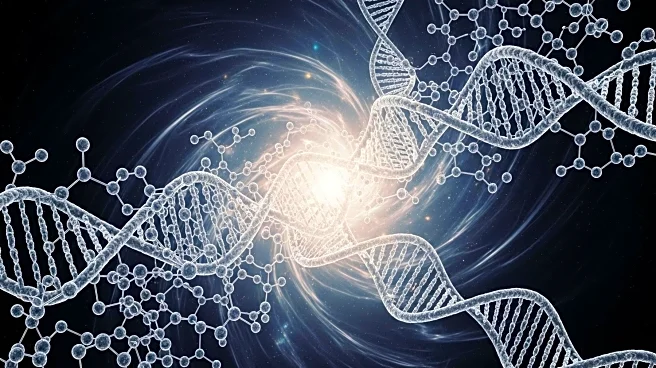What's Happening?
A recent study published in Nature has revealed how RNA molecules and amino acids can spontaneously combine to form proteins, providing insights into the origin of life. Proteins, essential for cellular functions, are typically synthesized within cells by ribosomes using RNA instructions. This study addresses the longstanding question of how proteins could have formed before the existence of cellular machinery. Researchers achieved this by linking amino acids to RNA using simple chemistry in water at neutral pH, suggesting that RNA might have initially controlled protein synthesis. The study highlights the role of pantetheine, a molecule crucial for metabolism, in facilitating the reaction between amino acids and RNA, potentially occurring in early Earth's freshwater environments.
Why It's Important?
This discovery is significant as it offers a plausible explanation for the formation of proteins before the existence of cellular machinery, a critical step in the origin of life. Understanding this process could have profound implications for fields such as biochemistry and evolutionary biology, potentially influencing theories about life's beginnings on Earth. The study also underscores the importance of RNA in early biochemical processes, which could lead to advancements in synthetic biology and the development of new biotechnologies. Researchers and industries focused on genetic engineering and molecular biology may benefit from these insights, as they could inform new methods for protein synthesis and manipulation.
What's Next?
Future research may focus on replicating these conditions to further understand the mechanisms behind spontaneous protein formation. Scientists might explore the role of other molecules in early biochemical processes, potentially leading to new discoveries about the origin of life. Additionally, this study could inspire investigations into the application of these findings in synthetic biology, aiming to create novel proteins or biochemical pathways. Stakeholders in the scientific community, including biochemists and evolutionary biologists, are likely to engage in discussions and experiments to validate and expand upon these findings.
Beyond the Headlines
The study raises ethical and philosophical questions about the nature of life and its origins, potentially influencing debates in scientific and philosophical circles. It also highlights the interconnectedness of chemistry and biology, suggesting that life may have emerged from simple chemical reactions. This could lead to a reevaluation of existing theories about life's beginnings and inspire interdisciplinary collaborations between chemists, biologists, and philosophers.









